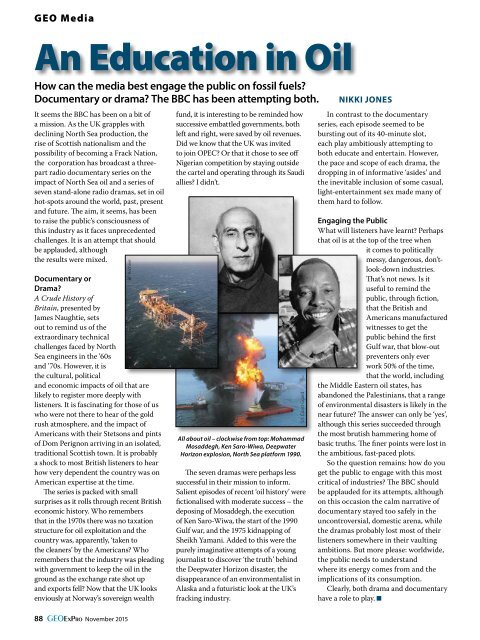Iraqi Kurdistan All in the Timing
GEO_ExPro_v12i6
GEO_ExPro_v12i6
Create successful ePaper yourself
Turn your PDF publications into a flip-book with our unique Google optimized e-Paper software.
GEO Media<br />
An Education <strong>in</strong> Oil<br />
How can <strong>the</strong> media best engage <strong>the</strong> public on fossil fuels?<br />
Documentary or drama? The BBC has been attempt<strong>in</strong>g both.<br />
It seems <strong>the</strong> BBC has been on a bit of<br />
a mission. As <strong>the</strong> UK grapples with<br />
decl<strong>in</strong><strong>in</strong>g North Sea production, <strong>the</strong><br />
rise of Scottish nationalism and <strong>the</strong><br />
possibility of becom<strong>in</strong>g a Frack Nation,<br />
<strong>the</strong> corporation has broadcast a threepart<br />
radio documentary series on <strong>the</strong><br />
impact of North Sea oil and a series of<br />
seven stand-alone radio dramas, set <strong>in</strong> oil<br />
hot-spots around <strong>the</strong> world, past, present<br />
and future. The aim, it seems, has been<br />
to raise <strong>the</strong> public’s consciousness of<br />
this <strong>in</strong>dustry as it faces unprecedented<br />
challenges. It is an attempt that should<br />
be applauded, although<br />
<strong>the</strong> results were mixed.<br />
BP Archive<br />
Documentary or<br />
Drama?<br />
A Crude History of<br />
Brita<strong>in</strong>, presented by<br />
James Naughtie, sets<br />
out to rem<strong>in</strong>d us of <strong>the</strong><br />
extraord<strong>in</strong>ary technical<br />
challenges faced by North<br />
Sea eng<strong>in</strong>eers <strong>in</strong> <strong>the</strong> ’60s<br />
and ’70s. However, it is<br />
<strong>the</strong> cultural, political<br />
and economic impacts of oil that are<br />
likely to register more deeply with<br />
listeners. It is fasc<strong>in</strong>at<strong>in</strong>g for those of us<br />
who were not <strong>the</strong>re to hear of <strong>the</strong> gold<br />
rush atmosphere, and <strong>the</strong> impact of<br />
Americans with <strong>the</strong>ir Stetsons and p<strong>in</strong>ts<br />
of Dom Perignon arriv<strong>in</strong>g <strong>in</strong> an isolated,<br />
traditional Scottish town. It is probably<br />
a shock to most British listeners to hear<br />
how very dependent <strong>the</strong> country was on<br />
American expertise at <strong>the</strong> time.<br />
The series is packed with small<br />
surprises as it rolls through recent British<br />
economic history. Who remembers<br />
that <strong>in</strong> <strong>the</strong> 1970s <strong>the</strong>re was no taxation<br />
structure for oil exploitation and <strong>the</strong><br />
country was, apparently, ‘taken to<br />
<strong>the</strong> cleaners’ by <strong>the</strong> Americans? Who<br />
remembers that <strong>the</strong> <strong>in</strong>dustry was plead<strong>in</strong>g<br />
with government to keep <strong>the</strong> oil <strong>in</strong> <strong>the</strong><br />
ground as <strong>the</strong> exchange rate shot up<br />
and exports fell? Now that <strong>the</strong> UK looks<br />
enviously at Norway’s sovereign wealth<br />
fund, it is <strong>in</strong>terest<strong>in</strong>g to be rem<strong>in</strong>ded how<br />
successive embattled governments, both<br />
left and right, were saved by oil revenues.<br />
Did we know that <strong>the</strong> UK was <strong>in</strong>vited<br />
to jo<strong>in</strong> OPEC? Or that it chose to see off<br />
Nigerian competition by stay<strong>in</strong>g outside<br />
<strong>the</strong> cartel and operat<strong>in</strong>g through its Saudi<br />
allies? I didn’t.<br />
<strong>All</strong> about oil – clockwise from top: Mohammad<br />
Mosaddegh, Ken Saro-Wiwa, Deepwater<br />
Horizon explosion, North Sea platform 1990.<br />
US Coast Guard<br />
The seven dramas were perhaps less<br />
successful <strong>in</strong> <strong>the</strong>ir mission to <strong>in</strong>form.<br />
Salient episodes of recent ‘oil history’ were<br />
fictionalised with moderate success – <strong>the</strong><br />
depos<strong>in</strong>g of Mosaddegh, <strong>the</strong> execution<br />
of Ken Saro-Wiwa, <strong>the</strong> start of <strong>the</strong> 1990<br />
Gulf war, and <strong>the</strong> 1975 kidnapp<strong>in</strong>g of<br />
Sheikh Yamani. Added to this were <strong>the</strong><br />
purely imag<strong>in</strong>ative attempts of a young<br />
journalist to discover ‘<strong>the</strong> truth’ beh<strong>in</strong>d<br />
<strong>the</strong> Deepwater Horizon disaster, <strong>the</strong><br />
disappearance of an environmentalist <strong>in</strong><br />
Alaska and a futuristic look at <strong>the</strong> UK’s<br />
frack<strong>in</strong>g <strong>in</strong>dustry.<br />
NIKKI JONES<br />
In contrast to <strong>the</strong> documentary<br />
series, each episode seemed to be<br />
burst<strong>in</strong>g out of its 40-m<strong>in</strong>ute slot,<br />
each play ambitiously attempt<strong>in</strong>g to<br />
both educate and enterta<strong>in</strong>. However,<br />
<strong>the</strong> pace and scope of each drama, <strong>the</strong><br />
dropp<strong>in</strong>g <strong>in</strong> of <strong>in</strong>formative ‘asides’ and<br />
<strong>the</strong> <strong>in</strong>evitable <strong>in</strong>clusion of some casual,<br />
light-enterta<strong>in</strong>ment sex made many of<br />
<strong>the</strong>m hard to follow.<br />
Engag<strong>in</strong>g <strong>the</strong> Public<br />
What will listeners have learnt? Perhaps<br />
that oil is at <strong>the</strong> top of <strong>the</strong> tree when<br />
it comes to politically<br />
messy, dangerous, don’tlook-down<br />
<strong>in</strong>dustries.<br />
That’s not news. Is it<br />
useful to rem<strong>in</strong>d <strong>the</strong><br />
public, through fiction,<br />
that <strong>the</strong> British and<br />
Americans manufactured<br />
witnesses to get <strong>the</strong><br />
public beh<strong>in</strong>d <strong>the</strong> first<br />
Gulf war, that blow-out<br />
preventers only ever<br />
work 50% of <strong>the</strong> time,<br />
that <strong>the</strong> world, <strong>in</strong>clud<strong>in</strong>g<br />
<strong>the</strong> Middle Eastern oil states, has<br />
abandoned <strong>the</strong> Palest<strong>in</strong>ians, that a range<br />
of environmental disasters is likely <strong>in</strong> <strong>the</strong><br />
near future? The answer can only be ‘yes’,<br />
although this series succeeded through<br />
<strong>the</strong> most brutish hammer<strong>in</strong>g home of<br />
basic truths. The f<strong>in</strong>er po<strong>in</strong>ts were lost <strong>in</strong><br />
<strong>the</strong> ambitious, fast-paced plots.<br />
So <strong>the</strong> question rema<strong>in</strong>s: how do you<br />
get <strong>the</strong> public to engage with this most<br />
critical of <strong>in</strong>dustries? The BBC should<br />
be applauded for its attempts, although<br />
on this occasion <strong>the</strong> calm narrative of<br />
documentary stayed too safely <strong>in</strong> <strong>the</strong><br />
uncontroversial, domestic arena, while<br />
<strong>the</strong> dramas probably lost most of <strong>the</strong>ir<br />
listeners somewhere <strong>in</strong> <strong>the</strong>ir vault<strong>in</strong>g<br />
ambitions. But more please: worldwide,<br />
<strong>the</strong> public needs to understand<br />
where its energy comes from and <strong>the</strong><br />
implications of its consumption.<br />
Clearly, both drama and documentary<br />
have a role to play.<br />
88 GEOExPro November 2015


